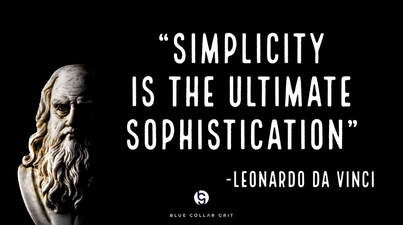Simply MagicWhen it comes to personal growth, the balance between order and complexity is a tricky one.
Bill Eckstrom created his growth ring model after documenting and researching over 75,000 coaching and leadership interactions. The model has four rings: Stagnation, Order, Complexity, and Chaos. The two extremes are easy to understand. Stagnation is exactly what one would think. It’s the pool of water with nothing coming in and nothing going out. Very little grows in stagnation and anything that does, quickly dies due to the lack of flow in and out. Growth is non-existent because discomfort is non-existent. Chaos is also what one would think. In an environment with a complete lack of order, the foundation for growth is never allowed to settle. Constant change never allows for the consistency progress requires. Growth in chaos is also non-existent. Neither order nor complexity provide much growth in isolation. Complexity is more manageable than chaos, but not stable enough for consistent growth. Order provides more challenge than stagnation, but not enough to stretch us regularly. It’s the combination of the other two that provide the magic. Why Should We Care? Stagnation needs to be off the table. Save it for vacation, which, even then, I would argue it has no place. But we can say vacation is the one acceptable time for stagnation. Order allows for repetition. Sustained growth is unquestionably tied to repeated actions. Order consists of daily habits, work routines, and family traditions. All are tremendous at cementing behaviors into our lives. Repetition is what separates order from all the other growth rings. The only problem with order is that it doesn’t produce much failure. Complexity however does. As much as we hate it, and try to avoid it, failure is critical for growth. And, complexity is the ring that injects the necessary failure into our lives. The struggle to figure out our purpose, how things work, and the best path to success stretches our edges and fosters progress. We may not like it, but we know we need it. Our willingness to embrace complexity will play a major role in our future, primarily whether or not we reach our goals and aspirations. Complexity alone, however, is missing the consistency that only order can provide. It’s this balance, or consistent bouncing back and forth, between order and complexity where significant growth exists. Introduce a little complexity, stay in it long enough to create some order, introduce a little more complexity until it becomes order … repeat. A shot of chaos now and then isn’t the worst thing in the world either. Sometimes that can make us appreciate the order and complexity more. REAL TALK - Action Steps This all applies to our performance in an important way - our ability to keep things simple. Simple for me and simple for you are two different things in regards to our behavior and actions, but they are exactly the same when it pertains to our growth rings. Simple always resides squarely in the center of order. Here are a few reminders for keeping it simple.
While our training and practice should stretch us into complexity, our performance should be in order. The goal is to continue pushing our order ring to higher and higher levels of performance. Contrary to popular belief, greatness is not complex. It’s simple. For more information on building excellence in your teams, visit us at www.bluecollargrit.com. We would love to know how we could help!
1 Comment
Dan Cunningham
5/5/2023 01:16:48 pm
Appreciate the advice on performance and growth.
Reply
Leave a Reply. |
About bcI'm a teacher, coach, and parent seeking excellence while defining success on my own terms. Archives
April 2024
Categories |


 RSS Feed
RSS Feed